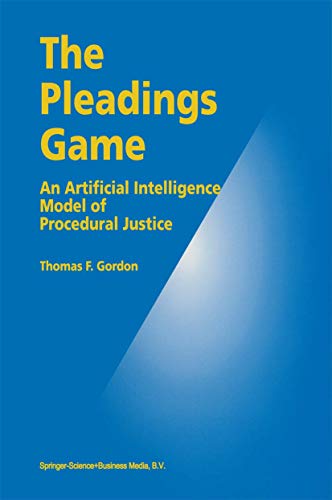Verwandte Artikel zu The Pleadings Game: An Artificial Intelligence Model...

Inhaltsangabe
The British philosopher Stephan Toulmin, in his The Uses of Argument, made the provocative claim that "logic is generalized jurisprudence". For Toulmin, logic is the study of nonns for practical argumentation and decision making. In his view, mathematical logicians were preoccupied with fonnalizing the concepts of logical necessity, consequence and contradiction, at the expense of other equally important issues, such as how to allocate the burden of proof and make rational decisions given limited resources. He also considered it a mistake to look primarily to psychology, linguistics or the cognitive sciences for answers to these fundamentally nonnative questions. Toulmin's concerns about logic, writing in the 1950's, are equally applicable to the field of Artificial Intelligence today. The mainstream of Artificial Intelligence has focused on the analytical and empirical aspects of intelligence, without giving adequate attention to the nonnative, regulative functions of knowledge representation, problem solving and decision-making. Nonnative issues should now be of even greater interest, with the shift in perspective of AI from individual to collective intelligence, in areas such as multi-agent systems, cooperative design, distributed artificial intelligence, and computer-supported cooperative work. Networked "virtual societies" of humans and software agents would also require "virtual legal systems" to fairly balance interests, resolve conflicts, and promote security.
Die Inhaltsangabe kann sich auf eine andere Ausgabe dieses Titels beziehen.
Reseña del editor
The British philosopher Stephan Toulmin, in his The Uses of Argument, made the provocative claim that "logic is generalized jurisprudence". For Toulmin, logic is the study of nonns for practical argumentation and decision making. In his view, mathematical logicians were preoccupied with fonnalizing the concepts of logical necessity, consequence and contradiction, at the expense of other equally important issues, such as how to allocate the burden of proof and make rational decisions given limited resources. He also considered it a mistake to look primarily to psychology, linguistics or the cognitive sciences for answers to these fundamentally nonnative questions. Toulmin's concerns about logic, writing in the 1950's, are equally applicable to the field of Artificial Intelligence today. The mainstream of Artificial Intelligence has focused on the analytical and empirical aspects of intelligence, without giving adequate attention to the nonnative, regulative functions of knowledge representation, problem solving and decision-making. Nonnative issues should now be of even greater interest, with the shift in perspective of AI from individual to collective intelligence, in areas such as multi-agent systems, cooperative design, distributed artificial intelligence, and computer-supported cooperative work. Networked "virtual societies" of humans and software agents would also require "virtual legal systems" to fairly balance interests, resolve conflicts, and promote security.
Reseña del editor
The Pleadings Game is a major contribution to artificial intelligence and legal theory. The book draws on jurisprudence and moral philosophy to develop a formal model of argumentation called the pleadings game. From a technical perspective, the work can be viewed as an extension of recent argumentation-based approaches to non-monotonic logic: (1) the game is dialogical rather than mono-logical; (2) the validity and priority of defeasible rules is subject to debate; and (3) resource limitations are acknowledged by rules for fairly dividing the burdens of representation and proof among the players.
Gordon's work evaluates important jurisprudential theories of argumentation and reasoning in the context of the U.S. commercial law on secured transactions.
Audience: It is not necessary to have a formal background in law to appreciate The Pleadings Game. It will be of equal interest to both the artificial intelligence community and legal theorists.
„Über diesen Titel“ kann sich auf eine andere Ausgabe dieses Titels beziehen.
Neu kaufen
Diesen Artikel anzeigenEUR 13,80 für den Versand von Vereinigtes Königreich nach USA
Versandziele, Kosten & DauerSuchergebnisse für The Pleadings Game: An Artificial Intelligence Model...
The Pleadings Game: An Artificial Intelligence Model of Procedural Justice
Anbieter: Ria Christie Collections, Uxbridge, Vereinigtes Königreich
Zustand: New. In. Artikel-Nr. ria9789048145911_new
Anzahl: Mehr als 20 verfügbar
The Pleadings Game: An Artificial Intelligence Model of Procedural Justice
Anbieter: Revaluation Books, Exeter, Vereinigtes Königreich
Paperback. Zustand: Brand New. 264 pages. 9.13x6.69x0.55 inches. In Stock. Artikel-Nr. x-9048145910
Anzahl: 2 verfügbar
The Pleadings Game : An Artificial Intelligence Model of Procedural Justice
Anbieter: AHA-BUCH GmbH, Einbeck, Deutschland
Taschenbuch. Zustand: Neu. Druck auf Anfrage Neuware - Printed after ordering - The British philosopher Stephan Toulmin, in his The Uses of Argument, made the provocative claim that 'logic is generalized jurisprudence'. For Toulmin, logic is the study of nonns for practical argumentation and decision making. In his view, mathematical logicians were preoccupied with fonnalizing the concepts of logical necessity, consequence and contradiction, at the expense of other equally important issues, such as how to allocate the burden of proof and make rational decisions given limited resources. He also considered it a mistake to look primarily to psychology, linguistics or the cognitive sciences for answers to these fundamentally nonnative questions. Toulmin's concerns about logic, writing in the 1950's, are equally applicable to the field of Artificial Intelligence today. The mainstream of Artificial Intelligence has focused on the analytical and empirical aspects of intelligence, without giving adequate attention to the nonnative, regulative functions of knowledge representation, problem solving and decision-making. Nonnative issues should now be of even greater interest, with the shift in perspective of AI from individual to collective intelligence, in areas such as multi-agent systems, cooperative design, distributed artificial intelligence, and computer-supported cooperative work. Networked 'virtual societies' of humans and software agents would also require 'virtual legal systems' to fairly balance interests, resolve conflicts, and promote security. Artikel-Nr. 9789048145911
Anzahl: 1 verfügbar

